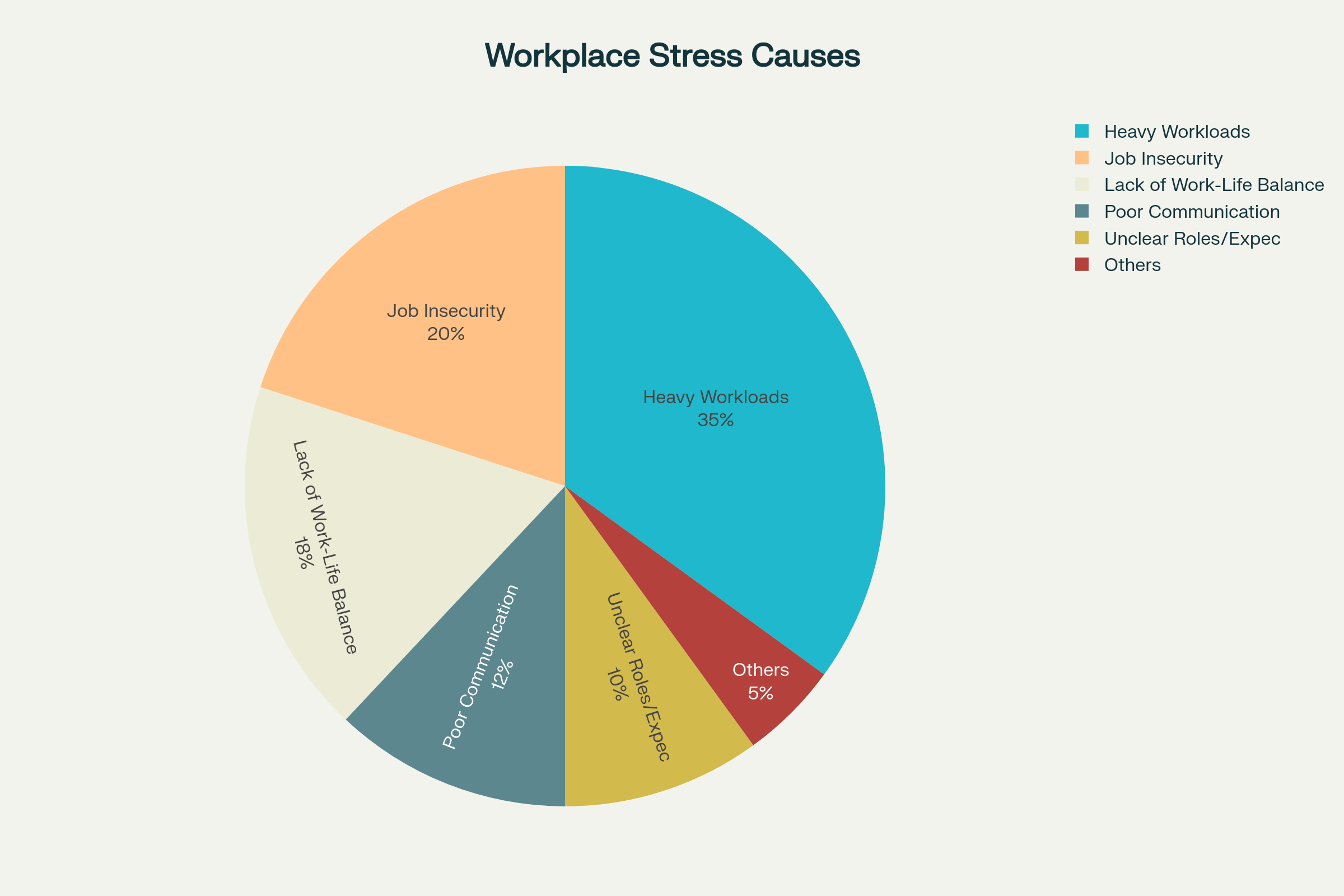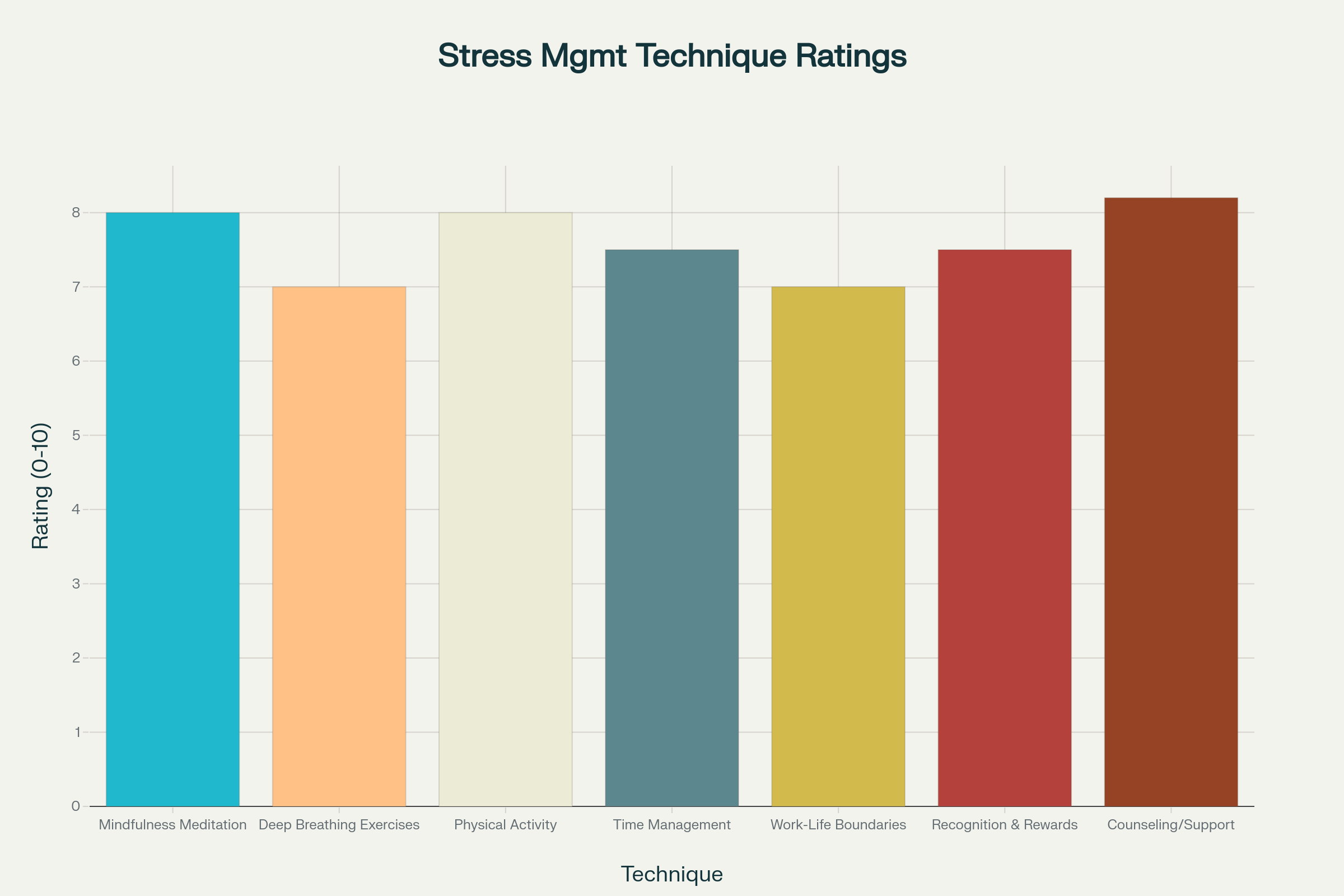Hi there! I’m Kairo Venn, and I’ve been working in busy offices for over 15 years. I’ve felt that tight feeling in my chest when deadlines pile up, and I’ve seen my coworkers struggle with the same thing. Workplace stress is real, and it affects millions of people every single day.
But here’s the good news: I’ve learned some amazing tricks that actually work! Today, I want to share the best stress management techniques that have helped me and thousands of other workers feel better and work smarter.
What Is Work Stress and Why Does It Happen?
Work stress is like having a heavy backpack that never comes off. It’s that worried feeling you get when you have too much to do or when things at work feel out of control1.
Stress happens when our brain thinks we’re in danger, even if it’s just a big project or a difficult boss. Our body gets ready to “fight or run away,” but since we can’t actually run from our desk, all that energy stays trapped inside us.

Pie chart showing the most common causes of workplace stress among employees
The chart above shows the main reasons why people feel stressed at work. As you can see, heavy workloads are the biggest problem, affecting 35% of workers1. This matches exactly what I’ve seen in my own career and with my friends.
The Top 10 Stress Management Techniques That Actually Work
1. Deep Breathing Exercises – Your Secret Weapon
This is my favorite technique because it works in just 30 seconds! When I feel stressed, I do this simple exercise:
- Breathe in slowly through your nose for 4 counts
- Hold your breath for 4 counts
- Breathe out through your mouth for 6 counts
- Repeat 3 times
Deep breathing tells your brain that everything is okay. It’s like pressing a reset button on your stress.
2. Time Management and Organization
I used to feel overwhelmed until I learned this simple trick. Every morning, I write down my tasks and number them 1, 2, 3 based on what’s most important.
Here’s my daily planning method:
- Must do today (write these first)
- Should do today (if I have time)
- Nice to do (bonus tasks)
This time management approach prevents that scary feeling of having too much to do.
3. Mindfulness and Meditation
Don’t worry – you don’t need to sit cross-legged or chant weird words! Mindfulness just means paying attention to right now instead of worrying about later.
Try this 5-minute office meditation:
- Sit comfortably in your chair
- Close your eyes or look at your desk
- Think about your breathing
- When your mind wanders to work stuff, gently bring it back to breathing
Studies show that mindfulness meditation can reduce stress by up to 40%.
4. Physical Activity During Work
Moving your body is like magic for stress! I take a 10-minute walk every lunch break, and it completely changes my afternoon.
Easy ways to stay active at work:
- Take the stairs instead of the elevator
- Walk around while talking on phone calls
- Do simple stretches at your desk
- Park farther away from the building
Physical activity releases happy chemicals called endorphins that fight stress naturally.
5. Setting Clear Boundaries
This was hard for me to learn, but it’s super important. Work-life balance means your job stays at work, and your personal time stays personal.
My boundary rules:
- I don’t check work emails after 6 PM
- I take real lunch breaks (not eating at my desk)
- I use all my vacation days
- I say “no” to extra projects when I’m already busy
6. Communication and Getting Help
For years, I suffered in silence because I thought asking for help made me look weak. I was totally wrong! Clear communication actually makes you look smart and responsible.
When to talk to your boss:
- When your workload feels impossible
- When deadlines don’t make sense
- When you need training or resources
- When workplace problems affect your health
Advanced Stress Management Strategies
Create a Stress-Free Work Environment
Your workspace affects how you feel. I’ve made these changes to my desk area:
- Added a small plant (plants reduce stress!)
- Keep healthy snacks nearby
- Use a comfortable chair
- Have good lighting
- Play soft background music when allowed
Build Strong Work Relationships
Having friends at work makes everything easier. Social support is one of the best stress fighters we have89.
Ways to connect with coworkers:
- Join team lunch groups
- Participate in office activities
- Offer help when others seem stressed
- Share positive comments and recognition

Bar chart comparing effectiveness of workplace stress management techniques (0–10 rating)
The effectiveness chart above shows which techniques work best for most people. Notice that counseling and support scores highest at 8.2 out of 10, which proves that getting help really works!
What Companies Can Do to Help (Share This With Your Boss!)
Smart companies know that less stressed workers are more productive. Here are programs that really help:
| Company Program | How It Helps | Cost to Company |
|---|---|---|
| Flexible work hours | Reduces commute stress | Low |
| Employee assistance programs | Professional counseling | Medium |
| Wellness programs | Gym memberships, yoga classes | Medium |
| Recognition programs | Boosts morale and motivation | Low |
| Mental health days | Prevents burnout | Low |
My Personal Stress Management Schedule
Here’s exactly what I do every workday to stay calm and focused:
Morning (7:00 AM – 9:00 AM):
- 5 minutes of deep breathing before checking emails
- Write my daily priority list
- Eat a healthy breakfast
Midday (12:00 PM – 1:00 PM):
- Take a real lunch break away from my desk
- Go for a 15-minute walk outside
- Practice gratitude (think of 3 good things)
Afternoon (3:00 PM):
- Do desk stretches
- Drink water and have a healthy snack
- Review my progress and adjust priorities
End of day (5:00 PM):
- Write down tomorrow’s top 3 priorities
- Clean and organize my workspace
- Turn off work notifications on my phone
Warning Signs: When to Get Professional Help
Sometimes stress management techniques aren’t enough, and that’s totally okay! Here are signs that you might need to talk to a counselor or doctor10:
- You can’t sleep because you’re thinking about work
- You feel sad or anxious most days
- You’re getting sick more often than usual
- You’re having headaches or stomach problems
- You’re using alcohol or other substances to cope
- Your family and friends are worried about you
Employee assistance programs and counseling are nothing to be ashamed of – they’re tools that help you get better, just like medicine helps when you’re sick.
Simple Daily Habits That Make a Big Difference
The best stress management happens when you do small things consistently. Here are my favorite daily habits:
- Start each day with intention – Ask yourself: “What’s most important today?”
- Take micro-breaks – Every hour, stop for 2 minutes and breathe
- Practice saying no – You can’t do everything, and that’s fine
- End work cleanly – Finish tasks completely before starting new ones
- Celebrate small wins – Did you finish that report? Give yourself credit!
Conclusion: You Have the Power to Feel Better
After 15 years in the working world, I can promise you this: workplace stress doesn’t have to control your life. The techniques in this guide have helped me transform from a constantly worried employee into someone who actually enjoys going to work most days.
Remember, managing stress is like building muscle – it takes practice, but it gets easier over time. Start with just one or two techniques that feel right for you. Maybe it’s the deep breathing exercise or taking real lunch breaks. Whatever you choose, be patient with yourself and celebrate small improvements.
Stress management isn’t about becoming a robot who never feels pressure. It’s about having tools to handle challenges in a healthy way. You deserve to feel good at work, and with these techniques, you absolutely can.
The most important thing I’ve learned? You’re not alone in feeling stressed, and you’re not weak for needing help. Millions of workers deal with the same challenges, and millions have found ways to feel better. Now it’s your turn.
Start today with one small change, and watch how much better you feel tomorrow. You’ve got this!